Nursing Old Licensures Pass Rates
Student Outcomes from 2016 to 2019
Licensures Pass Rates (Reválidas de Puerto Rico)
Nursing:
- Bachelor’s Degree in Nursing:
- Associate Degree in Nursing:
Documents in PDF
Documents in PDF
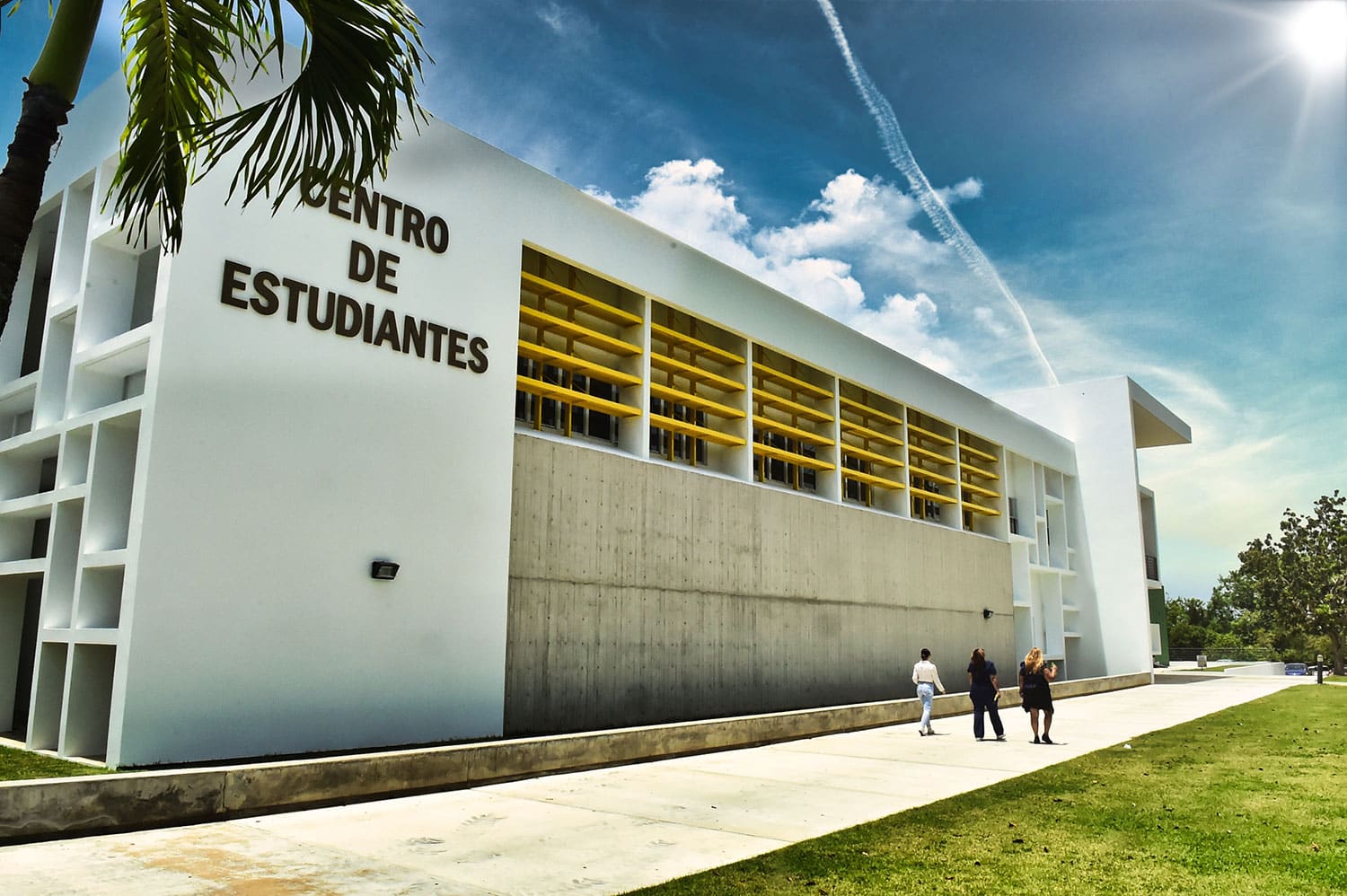
Under the Federal Student Right To Know Act, institutions of higher education that administer and participate in federal Title IV funds are required to disclose certain information to current and prospective students as well as to provide information of students receiving athletically related student aid. Namely, to provide graduation rate information for current and prospective students as well as student-athletes. The Aguadilla Campus provides additional information that includes but is not limited to the Student Consumer Handbook related to student loans, academic programs, graduation and retention rates, the privacy of student records, health and safety, and financial aid information.
De acuerdo a la Ley Federal sobre el Derecho a Saber (Student Right-to-Know), las instituciones de enseñanza superior que administran y participan en los fondos federales del Título IV están obligadas a revelar determinada información a los estudiantes actuales y futuros, así como a proporcionar información de los estudiantes que reciben ayudas estudiantiles relacionadas con el deporte. A saber, proveer información sobre la tasa de graduación para los estudiantes actuales y futuros, así como de la tasa de graduación de los estudiantes-deportistas. El Recinto de Aguadilla provee información adicional que incluye pero no se limita al Manual del Estudiante Consumidor relacionado a préstamos estudiantiles, programas académicos, tasas de graduación y retención, la privacidad de los expedients estudiantiles, la salud y seguridad, e la información de ayuda económica.
Información General / General Information:
Secuenciales de los Programas Académicos / Academic Programs Courses Sequence
Salud y Seguridad / Health and Security:
Asuntos Académico / Academic Affairs: Normas de Progreso Académico Satisfactorio / Standards of Satisfactory Academic Progress:
Vida Estudiantil / Student Life:
Reglamentos / Regulations:
Asistencia Económica / Financial Aid:
| Español | English |
|---|---|
| Manual de estudiante consumidor | Student Consumer Handbook |
Telecomunicaciones y Redes / Telecommunications and Networks:
Acomodo Razonable para Estudiantes / Student Reasonable Accomodation:
Querellas de los Estudiantes / Student Complaints
The Aguadilla Campus of the Inter-American University of Puerto Rico is accredited by:

Inter American University of Puerto Rico- Aguadilla Campus is an accredited institution and a member of the Middle States Commission on Higher Education (MSCHE) www.msche.org. IAUPR-Aguadilla Campus accreditation status is Accreditation Reaffirmed. The Commission’s most recent action on the institution’s accreditation status on 2013 was to reaffirm accreditation. MSCHE is an institutional accrediting agency recognized by the U.S. Secretary of Education and the Council for Higher Education Accreditation (CHEA).
1007 North Orange Street4th Floor, MB #166Wilmington, DE 19801
Also, the Aguadilla Campus belongs to the National Council for State Authorization Reciprocity Agreements (NC-SARA), which is a non-profit organization that helps expand student access to educational opportunities and ensures a more efficient regulation, coherent and effective distance education programs.
|
Program |
Accredited/ Reaccredited 2019-20 |
Accrediting |
Link |
|
BA in Education:
|
Reaccreditation in 2022-2023 |
TEAC (now CAEP) |
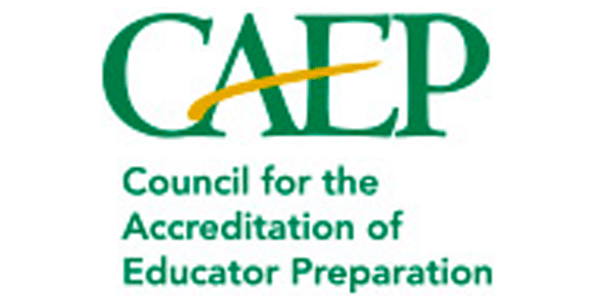 |
|
Reaccredited 2020-2028 |
National League for Nursing Accrediting Commission (NLNAC) now ACEN |
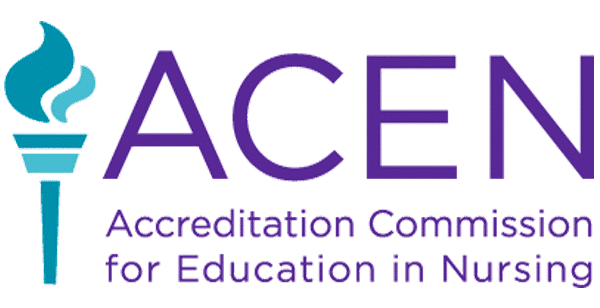 |
The Associate and Baccalaureate Nursing Programs at the Inter American University of Puerto Rico at the Aguadilla Campus located in Aguadilla, Puerto Rico are accredited by the: |
|||
|
Accredited 2019-2023 |
Council on Social Work Education (CSWE) |
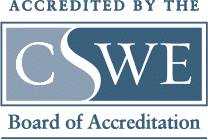 |
|
Reacredited 2018-2023 |
IACET |
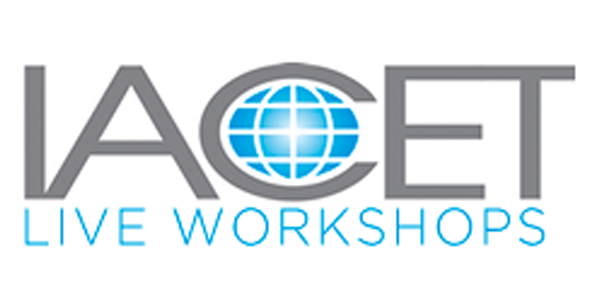 |
|
Lincense V50-10 2019-2024 |
Board of Postsecondary Institutions of Puerto Rico |
 |
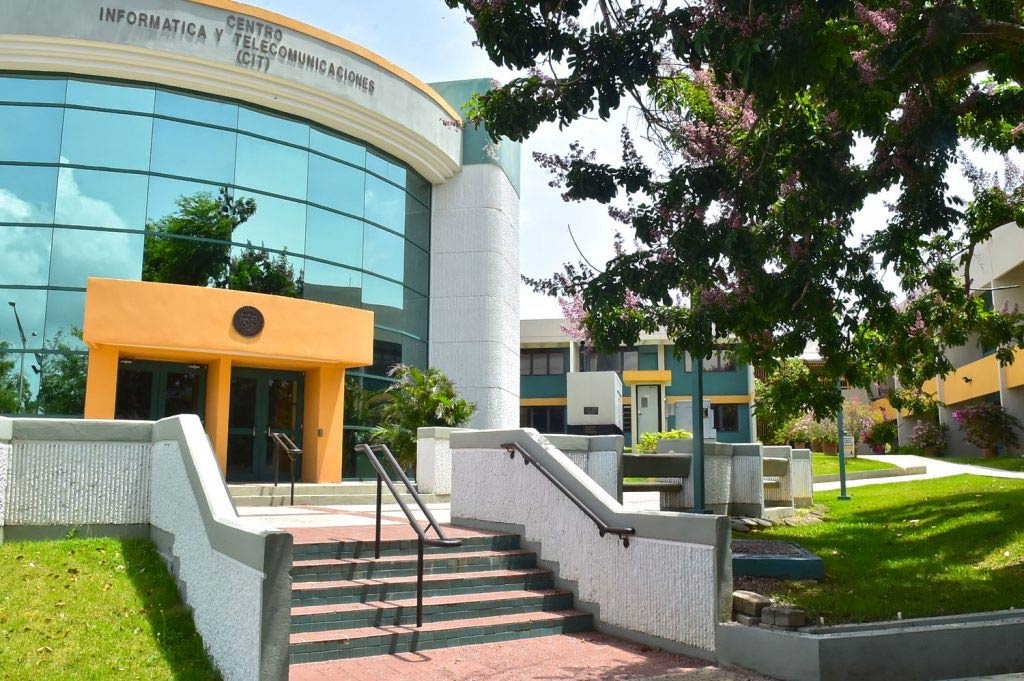
The Aguadilla Campus of the Inter-American University of Puerto Rico began its work as an auxiliary center for the San Germán Campus in 1957, in the old Aguadilla High School. In 1960, it relocated its facilities and began to offer secretarial and business administration courses, as well as the two-year study program to obtain the Normal Teacher Certificate. In 1965 it became a Regional College and in 1985 it inaugurated the structural complex at the Aguadilla Calero Sector. Then, in 1991 it became a Campus, through a resolution approved by the Board of Trustees.
With a progressive vision in the field of higher education, Distance Education Office was established in 2007, to integrate online courses that are dynamic, agile and effective, for students with various personal and professional responsibilities.
The mission of the Aguadilla Campus of the Inter-American University of Puerto Rico is the integral formation of its students, through an education of excellence, within an ecumenical Christian context, at all levels of formal education, with an emphasis on ethical, civic, democratic and Christian values.
Graduates are expected to possess extensive scientific, humanistic, and technical knowledge. Likewise, that they are trained for the critical analysis of reality. They will develop as responsible individuals, committed to the environment, at the service of an interdependent, pluralistic and global community, and capable of adapting to change.
In keeping with this purpose, academic areas will be strengthened, giving special attention to interdisciplinary education, distance education in its virtual component, with national and international scope and projection, and the integration of technology in all areas of knowledge. These will be developed through an articulated management of institutional operations and resources, in accordance with political, economic, social, technological, environmental and cultural changes, within a universal context.
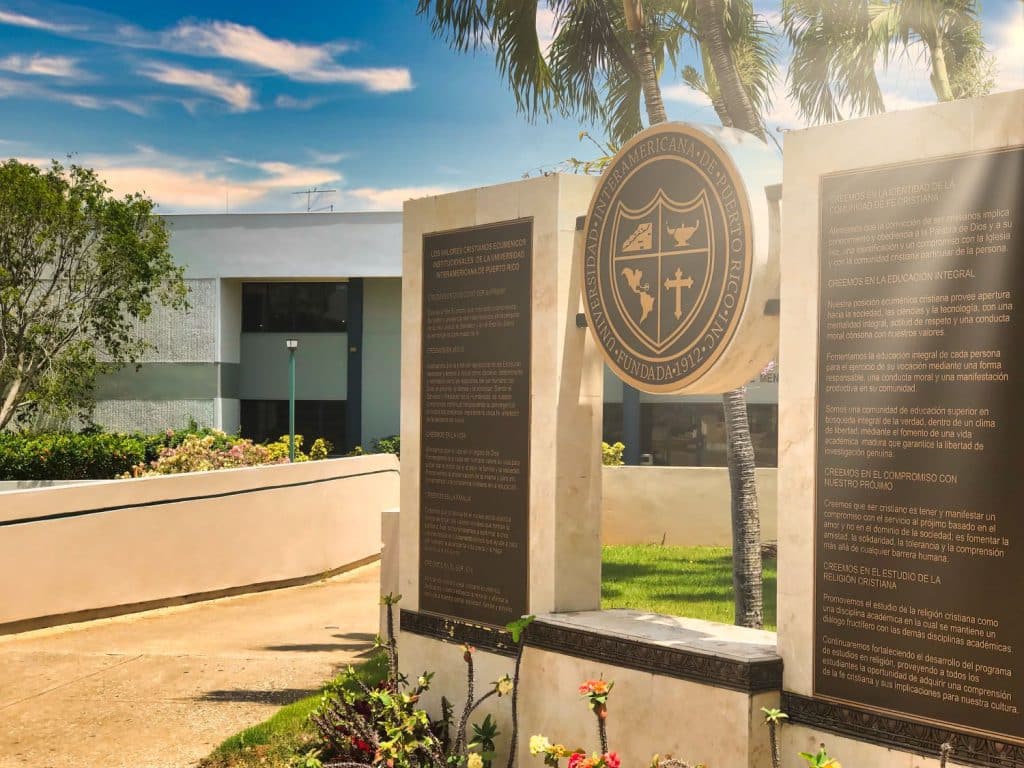 Institutional Christian-ecumenical Values
Institutional Christian-ecumenical Values 
The Inter American University of Puerto Rico, Aguadilla Campus, represents the best private educational alternative in the country. Through the years, our Institution has served the community of the northwest area with quality and professionalism. It has an excellent and committed faculty. Its varied academic offer, the financial aid it provides, the latest technological infrastructure and the constant support for our student community make our Campus the best academic alternative in the northwest area.
At the Inter Aamerican University we are one big family. We invite you to be part of it.
Dr. Élie Agésilas, Chancellor
Inter Aguadilla
Postal Address:
PO Box 20000
Aguadilla, PR 00605
Phisical Address:
Road PR-459 Int. 463
Bo. Corales Sector Calero
Aguadilla, PR 00605
Phone:
Main: (787) 891-0925
Enrollment Management: (787) 931-0931
University Guard: (787) 931-0837
GPS Coordinates:
Latitude=18.467642, Longitude= -67.122962
(Latitude=18.468N, Longitude= 67.123W)
The Middle States Commission on Higher Education (MSCHE) provides accreditation for degree granting Institutions of Higher Education in Delaware, the District of Columbia, Maryland, New Jersey, New York, Pennsylvania, Puerto Rico, the Virgin Islands, and any other areas within and outside of the United States.
MSCHE makes sure that institutions meet the Standards for Accreditation and fulfill the Requirements of Affiliation while ensuring that the institutional mission and goals align to the Standards for Accreditation in order to achieve academic excellency. The process of maintaining excellency is a continuous one and all institutions of higher education must reaffirm their commitment and compliance to the Standards of Accreditation and Requirements of Affiliation every eight years with various review points during the eight-year period.
Reaffirmation begins with a well-designed self-study process that is guided by a Steering Committee that is representative of the university and its students. Working groups are assigned to each of the seven Standards for Accreditation and are charged with conducting a thorough analysis of the University’s mission, goals, academic offerings, services, programs, and facilities to evaluate compliance and excellency. The self-study analysis culminates with an Institutional Self-Study Report and a campus visit by academics and administrators from other institutions who review the Self-Study Report and provided evidence in order to recommend reaffirmation of accreditation to the Middle States Commission on Accreditation.
![]()
Inter American University of Puerto Rico, Aguadilla Campus, is an accredited institution and a member of the Middle States Commission on Higher Education (MSCHE) www.msche.org. Inter American University of Puerto Rico, Aguadilla Campus’s accreditation status is Accreditation Reaffirmed. The Commission’s most recent action on the institution’s accreditation status on June 27, 2013 was to reaffirm accreditation.
MSCHE is an institutional accrediting agency recognized by the US Secretary of Education and the Council for Higher Education Accreditation (CHEA).
Standard I – Mission and Goals
The institution’s mission defines its purpose within the context of higher education, the students it serves, and what it intends to accomplish. The institution’s stated goals are clearly linked to its mission and specify how the institution fulfills its mission.
Standard II – Ethics and Integrity
Ethics and integrity are central, indispensable, and defining hallmarks of effective higher education institutions. in all activities, whether internal or external, an institution must be faithful to its mission, honor its contracts and commitments, adhere to its policies, and represent itself truthfully.
Standard III – Design and Delivery of the Student Learning Experience
An institution provides students with learning experiences that are characterized by rigor and coherence at all program, certificate, and degree levels, regardless of instructional modality. All learning experiences, regardless of modality, program pace/schedule, level, and setting are consistent with higher education expectations.
Standard IV – Support of the Student Experience
Across all educational experiences, settings, levels, and instructional modalities, the institution recruits and admits students whose interests, abilities, experiences, and goals are congruent with its mission and educational offerings. The institution commits to student retention, persistence, completion, and success through a coherent and effective support system sustained by qualified professionals, which enhances the quality of the learning environment, contributes to the educational experience, and fosters student success.
Standard V – Educational Effectiveness Assessment
Assessment of student learning and achievement demonstrates that the institution’s students have accomplished educational goals consistent with their program of study, degree level, the institution’s mission, and appropriate expectations for institutions of higher education.
Standard VI – Planning, Resources, and Institution Improvement
The institution’s planning processes, resources, and structures are aligned with each other and are sufficient to fulfill its mission and goals, to continuously assess and improve its programs and services, and to respond effectively to opportunities and challenges.
Standard VII – Governance, Leadership, and Administration
The institution is governed and administered in a manner that allows it to realize its stated mission and goals in a way that effectively benefits the institution, its students, and the other constituencies it serves. Even when supported by or affiliated with governmental, corporate, religious, educational system, or other unaccredited organizations, the institution has education as its primary purpose, and it operates as an academic institution with appropriate autonomy.
To be eligible for, to achieve, and to maintain Middle States Commission on Higher Education accreditation, an institution must demonstrate that it fully meets the following Requirements of Affiliation. Compliance is expected to be continuous and will be validated periodically, typically at the time of institutional self-study and during any other evaluation of the institution’s compliance. Once eligibility is established, an institution then must demonstrate on an ongoing basis that it meets the Standards for Accreditation.
The following are the members of the Steering Committee that will guide this process.
| Steering Committee Membership | |
| Name | Titles |
| Dr. Irma Sandoval-Arocho | Steering Committee Chair
Associate Professor, Social and Behavioral Sciences Department |
| Dr. Gricel Ruiz | Steering Committee Co-chair
Assistant Professor, Science and Technology Department |
| Prof. Dolores Sepúlveda | Director, Development and Alumni Office |
| Prof. Lizzie Colón | Director, Center for Information Access (Library) |
| Prof. Nararly Claudio | Dean of Students |
| Dr. Bernabé Soto | Director, Distance Education and Internationalization Office |
| Prof. Ligia González | Assistant Professor, Economic and Administrative Sciences Department |
| Prof. María Pérez | Registrar |
| Prof. Yesenia González | Assistant Professor, Health Sciences Department |
| Prof. Elidine González | Assistant Professor, Economic & Administrative Sciences Department |
| Dr. Gladys Varela | Assistant Professor, Graduate Studies Department |
| Dr. Jorge Agudo | Assistant Professor, Science and Technology Department |
| Arelis Cruz Soto | Student Representative |
| Dr. Élie Agésilas | Chancellor (Ex-officio) |
| Dr. Evelyn Castillo | Dean of Academic Affairs (Ex-officio) |
| Mr. Edwin Soto | Dean of Administration (Ex-officio) |
The following faculty and administrative personnel comprise the working groups that will participate in the self-study analysis.
The Steering Committee has devised the following Communication Plan to guide communication and ensure transparency throughout the self-study process. This includes updating key stakeholders and constituencies about major developments and details key moments for gathering feedback.
|
Communication Plan |
|||
|
Purpose |
Intended Audiences |
Communication Methods |
Timing |
| To share data, documents and research results and communicate it in a secure, transparent, and convenient manner | Steering Committee and Working Group Members | Microsoft Office Suite & Microsoft Teams | Fall year 2020 – Spring year 2023 |
| To update campus constituencies about the Self-Study process | Students | Emails, Campus Webpage, social media pages, forums, Infographics | Self-Study Design
Fall 2020-Spring 2021 Self-Study Process Spring 2021-Spring 2023 |
| Alumni | Jotform Contacts, Campus Webpage,
Social media pages, forums |
Self-Study Design
Fall 2020-Spring 2021 Self-Study Process Spring 2021-Spring 2023 |
|
| Faculty | Emails, Social media pages Forums, Faculty meetings | Self-Study Design
Fall 2020-Spring 2021 Self-Study Process Spring 2021-Spring 2023 |
|
| Administration and Staff | Emails, Forums, meetings | Self-Study Design
Fall 2020-Spring 2021 Self-Study Process Spring 2021-Spring 2023 |
|
| Academic Senate | Academic Senate Meetings | Spring 2021- Spring 2023 | |
| General Community | Campus Webpage, Social media page, Infographics | Spring 2021 – Spring 2023 | |
| To gather feedback about Working Group reports | Students | Forums, Emails, Surveys | Spring 2022-Fall 2022 |
| Alumni | Forums, Emails, Surveys | Spring 2022-Fall 2022 | |
| Faculty | Forums, Emails, Surveys | Spring 2022-Fall 2023 | |
| Administration & Staff | Forums, Emails, Surveys | Spring 2022–Fall 2023 | |
| To gather feedback about the Final Self-Study Report | Students | Forums, Emails, Surveys | Fall 2022 |
| Alumni | Forums, Emails, Surveys | Fall 2022 | |
| Faculty | Forums, Emails, Surveys | Fall 2022 | |
| Administration & Staff | Forums, Emails, Surveys | Fall 2022 | |
| To publish results of the Final Self-Study Report | Students, Alumni
Faculty, Administration & Staff |
Campus Webpage, Forums, Emails | Spring 2023 |
| To inform constituents about the MSCHE Campus visit | Students, Alumni, Faculty, Administration & Staff | Campus Webpage, Emails | Fall 2022-Spring 2023 |
| To announce the MSCHE reaffirmation decision | Students, Alumni
Faculty, Administration & Staff |
Campus Webpage, Forums, Emails | Fall 2023 |
The Self-Study Timetable highlights the major activities and tasks that will lead to the completion of the Final Self-Study Report and evaluation team visit in the Spring.
| Date | Activity/Task |
| August 2020 | Steering Committee Chair, Co-Chair and members are appointed |
| October – November 2020 | Select members participate in the MSCHE Self-Study Institute |
| October 2020 | Steering Committee convenes and kick off meeting is held |
| January 2021 | Conference Call with VP Liaison is held |
| January-March 2021 | Prepare Self-Study Design |
| March 12, 2021 | Final draft of Self-Study Design is completed |
| April 9, 2021 | Submit Self Study Design to VP Liaison |
| April 23, 2021 | Meeting to discuss Self-Study Design with the VP Liaison |
| August 2021 | Working Groups convene |
| August 2021 – April 2022 | Working Groups report to the Steering Committee |
| April 2022 | Working Group Submit Final Reports to the Steering Committee |
| May 2022 | Prepare Self-Study |
| November 2022 | Final draft of Self-Study is completed |
| December 2022 | Self-Study Report is finalized |
| January 2023 | Self-Study Report is shared with the campus community |
| Spring 2023 | Evaluation team visit to the campus |
Emergency Financial Aid Grants to Students under the Coronavirus Aid, Relief, and Economic Security Act, (CARES Act) and the Coronavirus Response and Relief Supplemental Appropriations Act, (CRRSAA)
Educación a Distancia Apoyo Técnico – Facultad
Lunes a Jueves
Horario: 11:00 AM -12:30 PM, 3:00 PM – 4:30 PM & 5:00 PM – 6:30 PM
Educación a Distancia Apoyo – Estudiantes
Lunes a Sábados
8:00 AM a 12:00 – 1:00 PM a 5:00 PM
Centro de Acceso a la Información (CAI)
Lunes a Viernes
Horario: 8:00 AM – 8:00 PM
Sábados
8:00 AM – 1:00 PM
Programa de Honor
Acceder a Sala VirtualConsejería Profesional Servicios Educativos
Horario
Servicios Estudiantes Upward Bound Math & Science
Acceder al Horario y SalasAsistencia Económica
Acceder a Sala 1